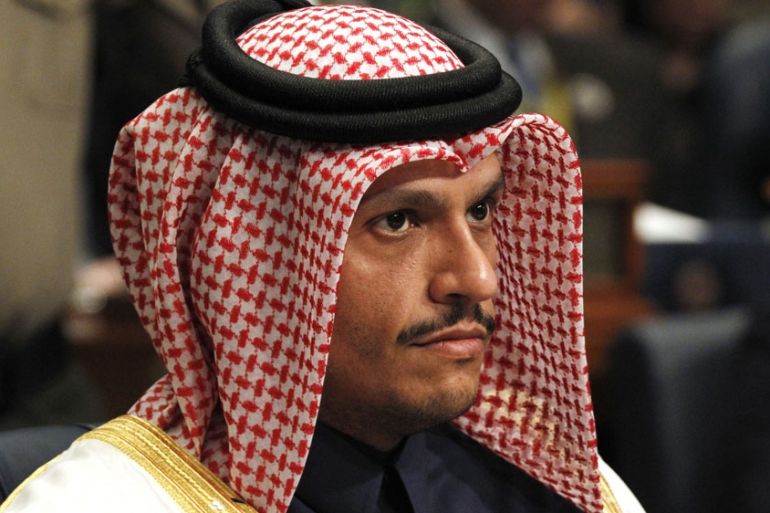Qatar expresses reservations over Mecca summit outcome
Qatar’s foreign minister has questioned the hardline statements on Iran made at emergency summits in Mecca.

Qatar said on Sunday it had reservations about hardline statements on Iran made at emergency summits in Mecca organised by Saudi Arabia.
“The statements condemned Iran but did not refer to a moderate policy to speak with Tehran,” Sheikh Mohammed bin Abdulrahman Al Thani, Qatar’s foreign minister, told Al Jazeera.
Keep reading
list of 4 itemsQatar emir condemns ‘genocide’ in Gaza, urges ceasefire at GCC summit
‘Enduring commitment’: Key takeaways from US-GCC joint statement
Analysis: Efforts to end Assad isolation gather speed after quake
The summits “adopted Washington’s policy towards Iran and not one that takes the neighbourhood into consideration”, he added.
He questioned the unity called for by neighbouring countries amid an ongoing blockade against the Gulf country.
The Gulf summit statement talked about a unified Gulf, but where is it amid the continuation of Qatar's blockade?
“The Gulf summit statement talked about a unified Gulf, but where is it amid the continuation of Qatar’s blockade?” he said.
Qatar’s Prime Minister Sheikh Abdullah bin Nasser Al Thani attended the event that saw participation of member countries from Organisation of Islamic Countries, Arab League and Gulf Cooperation Council.
Hitting back, Saudi Arabia and the UAE criticised Qatar for raising these reservations.
“Countries… during summits announce their positions and reservations in the meetings according to customs and not after the meetings,” Saudi Arabia’s minister of state for foreign affairs, Adel al-Jubeir said on Twitter on Monday.
The United Arab Emirates’ minister of state for foreign affairs, Anwar Gargash, criticised Doha for being “weak” under pressure.
“Seems to me that attendance and agreement in meetings and then backtracking on what was decided on is (a result of) pressure on the weak that lack sovereignty or have ill intentions or lack credibility, and it might be all these factors,” he tweeted late Sunday.
The three emergency summits, which Saudi Arabia hosted in the holy city of Mecca over the weekend, came following attacks on oil assets, including two Saudi oil tankers off the United Arab Emirates (UAE) coast.
King Salman blasted Iran for what he called its “naked aggression” against the region’s “stability and international security”.
Tehran rejected the accusations as baseless, saying that Saudi Arabia had jointed the United States and Israel in a “hopeless” effort to mobilise regional opinion against it.
In June 2017, Saudi Arabia, Egypt, Bahrain and the UAE cut off ties with Qatar and imposed a land, sea and air blockade on the Gulf state.
The quartet accuses Qatar of supporting “terrorism” and “destabilising the region,” accusations that Doha has consistently denied.
Doha turned to Tehran to ease its economic isolation, sourcing key imports from Iran and rerouting many flights by its flag carrier Qatar Airways over the Islamic republic.
Not consulted
Earlier in the day, the Qatari foreign minister told the UK-based Al-Araby broadcaster that the meetings’ final statement were made without his country’s input.
“The statements of the Gulf and Arab summits were ready in advance and we were not consulted on them,” Abdulrahman told Al-Araby.
“Qatar has reservations on the Arab and Gulf summits because some of their terms are contrary to Doha’s foreign policy,” he added.
|
|
The Mecca summit backed Saudi Arabia over escalating tensions with Iran.
“We hoped the Mecca summits would lay the groundwork for dialogue to reduce tensions with Iran,” the foreign minister added in comments reposted on Twitter by his ministry.
“The Mecca summit ignored the important issues in the region, such as the Palestine issue and the war in Libya and Yemen.”
|
|